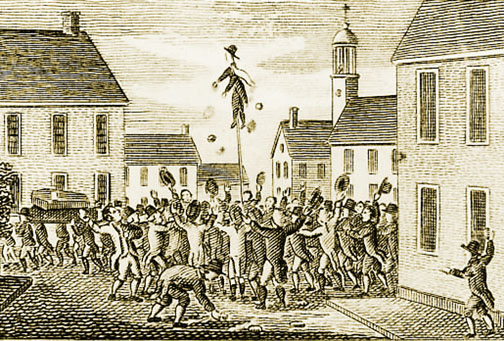Sons of Liberty |
 |
The Sons of Liberty was a secret organized founded in response to the 1765 Stamp Act that required colonists to pay a tax on printed documents. The Stamp Acts was issued to help the British recoup the financial burden incurred for prosecuting the French and Indian War. The origins of the Sons of Liberty is unclear, but the organization worked in both Boston and New York. Its purpose was to protect the rights of colonists and to protest British taxes. Samuel Adams is often credited with founding the Sons of Liberty. The motto of the Sons of Liberty was “no taxation without representation.” The first known protest organized by the Sons of Liberty occurred on August 14, 1765. Under the “Liberty Tree,” a popular meeting place for the Sons of Liberty, supporters hung an effigy of tax collector Andrew Oliver from the tree. Those in attendance took turns punching it and stomping on it. Before long, the effigy was dragged through the streets of Boston while bystanders cheered and jeered. The mob next struck at Oliver’s home, which was thoroughly destroyed. Oliver resigned his position as a tax collector three days later. On August 26, the Sons of Liberty destroyed the home of the unpopular lieutenant governor, Thomas Hutchinson. As the path to war became clear, the Sons of Liberty used mob rule and intimidation as powerful weapons against British agents and Loyalists. In some cases, members of the Sons of Liberty were reported to have tarred and feathered perceived enemies such as tax collectors and customs officers. Tarring and feathering involved pouring hot pine tar on a person before covering them in feathers. Although certainly painful and embarrassing, tarring and feathering was not fatal. The Sons of Liberty are best known for staging the Boston Tea Party on December 16, 1773, in protest of the Tea Act, which allowed a British company a monopoly over the tea trade. In the Boston Tea Party, members of the Sons of Liberty dressed up as Indians, boarded a British tea vessel called Dartmouth, and flung its entire load of tea into Boston Harbor. The “party” and the resulting Intolerable Acts passed by Parliament as a punishment, were among the primary causes of the coming war |